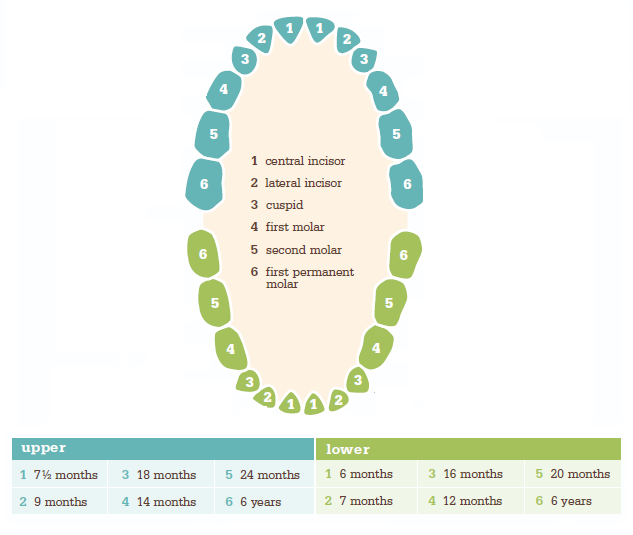Teething Facts
WowieStar team encourages each parent read teething facts to help picking up the right solutions for your teething babies!
Teeth Eruption Timing
Approximate age of eruption for each tooth

[Courtesy Info from thebump.com]
Teething Signs
Symptoms can last for just a few days, right around the time a new tooth is emerging, or for as long as several months if a lot of teeth come through all at once. For a few lucky babies (and parents), teething doesn't cause any noticeable signs at all. What's tricky is that there's no single set of teething symptoms.
"No more than a third of babies have any one symptom," says pediatrician Deb Lonzer, chairperson of the Department of Community Pediatrics at Cleveland Clinic Children's Hospital. "So, one-third of the kids might drool, another third might be irritable, and another third might have trouble sleeping."
Here's a list of teething symptoms:
- Drooling
- Irritability
- A tooth visible below the gum
- Swollen, bulging gums
- Trying to bite, chew, and suck on everything she can get her hands on
- Rubbing her face
- Difficulty sleeping
- Turning away food
- Grabbing her ears
If you notice several of these symptoms together, it's more likely that teething is to blame, but there's always the chance that it's something else, please check with your pediatrician.
Teething Remedies
Cold things
In the same way that ice works on a sprained ankle to numb pain and reduce swelling, cold compresses and food soothe sore gums.
Place a wet washcloth in a clean plastic bag and chill it in the refrigerator. When you remove the washcloth from the bag, your child will enjoy munching on it because the fabric massages the ridges in her gums while the cold numbs the pain.
Try a refrigerated teether. Check out the teether safety temperature range before doing so since some teethers on the market will become hard when frozen it and it will damage a baby's gums. WowieStar is safe from -40F~248F/-40C~120C. It keeps soft and high tear strength regardless the temperature. You can't find anything different except coldness/warmness.
There are a variety of refrigerated teethers, including some with plastic handles so your baby's hands won't get cold, but baby has no idea what part to chew on what part to hold on, always check any part of teether's safety guide. Liquid-filled teethers work well, but watch for leaks. Firm rubber teething rings are a good alternative. Some babies are allergic to rubber though. And keep an eye on your baby to make sure she doesn't choke as she gnaws away on it.
Pressure
Teething babies love to feel pressure on their gums because it helps distract their brain from the sensation of teething pain.
If your baby rejects cold items, chewing on a teether at room temperature may do the trick. Usually molars are harder to broke through. WowieStar invented by an innovative solution, it has full coverage from front teether to back molars. It has amazingly high tear strength.
Topical medication
Some parents use a topical anesthetic – a numbing gel or cream that you rub on your baby's gums – to relieve teething pain. These are available over the counter in drugstores. However, the U.S. Food and Drug Administration (FDA) warns that topical medications containing benzocaine shouldn't be used on children under 2 without guidance from a doctor.
One risk is that the medication won't stay where you put it. Even if you rub it directly on your baby's gums, she might swallow some of it with her saliva. This can inadvertently numb her throat and interfere with her gag reflex, making it harder for her not to choke.
In rare instances, benzocaine can cause methemoglobinemia, a serious condition in which the amount of oxygen in the blood drops dangerously low.
Painkillers
If nothing is working and your baby needs relief, your doctor might recommend trying an over-the-counter painkiller like acetaminophen. (Note: Don't give new medicines to a baby without first checking with a doctor. Ask the doctor for the proper dosage whenever giving acetaminophen to a child younger than 2.)
For babies at least 6 months old, ibuprofen is another option for reducing inflammation in your baby's gums. But bear in mind that the drug can irritate the stomach, which may be problematic if your baby's already refusing to eat (which some teething babies do).
Aspirin is off-limits for anyone under 19 years old. Don't give it to your baby or even rub it on her gums. The drug is associated with Reye's syndrom, a rare but potentially life-threatening condition.
Fever, vomiting, and diarrhea aren't normal symptoms of teething. If your baby has a persistent fever, gets worse, or seems sick, call the doctor.
Homeopathic remedies
Some parents swear by homeopathic teething drops and tablets. (A homeopathic remedy is a highly diluted form of a substance that is known to cause the symptoms you're trying to cure. The idea is that a tiny or even imperceptible amount of an active substance – which could be toxic at higher levels -- would stimulate healing.)
However, many studies have found that homeopathic remedies have no effect. And many pediatricians believe that the risks of these treatments far outweigh any potential benefits. They're not evaluated by the FDA for safety and effectiveness the way prescription and over-the-counter medications are.
Before using a homeopathic remedy, discuss it with your child's doctor and check the FDA's list of recalled homeopathic products.
[WowieStar team is a big fan of www.babycenter.com, we have used it since Chelsea was born. All courtesy teething facts information is from www.babycenter.com]
